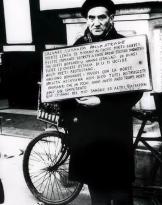With the end of the holidays, is it the case to take home some war souvenirs? Why not?!!! Many think. Those who do, however, run enormous dangers, both from the point of view of their own and others' safety, and from the point of view of the law.
Italy is certainly one of the most beautiful countries in the world. Art, nature, cuisine and good living make it attractive even to the Italians themselves. But too often we forget that it was a country interested in modern wars, therefore subject to bombing. Not infrequently, therefore, there are chances of finding unexploded ordnance in the most disparate places. They can be old and rusty, but they are still lethal. A demonstration was the June 30 us, following a fire in the woods, near Cortina d'Ampezzo, two old remnants of war exploded. No dead and no wounded, thankfully.
In Italy there are people and structures that work incessantly since the end of the Second World War to secure the territory, but the bombs to be found are still many. To take stock of the situation we met Giannantonio Massarotti, who has a vast experience in the field.

Let's be clear: are the FFAA the only ones that can intervene to reclaim the land where there could be a possible bomb?
Only in the final part. Land reclamation from bombs is of two types: reclamation occasional and reclamation systematic. That occasional is when the device is seen by a simple citizen and reported to the competent authorities. For example, with the renovation of the roof, an unexploded bomb is discovered between the tiles. In this case the bomb technicians who secure the device are involved directly.
Another argument is the systematic reclamation of a more or less vast area. In this case it is a planned activity carried out by an authorized company and with qualified personnel at the request of the interested party of the work or land.
The FFAA, (EOD specialized departments for the competence on the ground and SDAI Units for the sea), enter the scene only if a bomb is detected, as they are the only ones that can touch it and make it safe. I give an example: the Municipality must expand a building area, so contact a specialized company for the systematic reclamation of the area. The company is authorized by the Infrastructure Departments of Padua and Naples for the land and by Maricomlog of Naples for the sea. At the end of the work the company issues the Terrestrial or Underwater Systematic Reclamation Certificate of the site, to which is then attached the Validation Report issued by the aforementioned Departments, which have the authority to perform the Control and Supervision on the authorized works and proves the reclamation, but which is not the same from any responsibility.
In summary, both with occasional decontamination and with systematic decontamination in the event of a detected bomb only the FFAA bomb squad can make it safe and make it shine.

Are the personnel who carry out systematic decontamination qualified and have obtained patents or is it enough just to know how to use a metal detector?
Do not mention it! He is highly qualified and registered on the Register: he is trained with specific BCM courses (mine clearance), handles very sophisticated equipment and is equipped with accident-prevention clothing. Let us remember that we are talking about explosive devices.
The courses for the patent, active from the 1984, form the staff on three levels: the rake-up, the technical assistant (who has already had the raker's patent for at least two years) and the technical manager who takes care of the administrative part. It is renewed every two years with a medical examination stamped by a doctor of the AD, which outcome will be sent to the appropriate office responsible for the territory (Naples or Padua, the only ones remaining against the eight existing before the 1999).
Based on your experience, how much do citizens perceive the risk of an unexploded bomb?
Unfortunately, in most cases it is not perceived. The curiosity as an end to itself for the "piece of rusty iron" is the host.
What was the biggest bomb with which he had to try his hand?
Apart from the quarry explosives in industrial quantities it was the "HC MK III" from 4000 pounds found and deactivated the 16 February 1996 at Villa San Giovanni. It's a huge bomb of both volume and power. It was used a lot with little success because many did not explode. They probably weren't well thought out. Many ended up buried. They were not used for carpet bombing, like those from 500 or 1000 pounds, but only for bombings aimed at large infrastructures.
 The smaller one?
The smaller one?
In addition to various types of hand and butterfly bombs, the one camouflaged in a pen: attractive and mutilating. I am my age, but I still remember the illustrations of Molino, in a special awareness campaign on the subject, of a child injured by such devices. It was designed to mutilate rather than kill, so as to demoralize and force the logistics to intervene with mobile hospitals resulting in increased costs.
Do citizens know who to call if a bomb is found?
In most cases they don't know where to turn. But the problem is always the curiosity that prevails over the awareness of danger. I always say this to everyone I know: if you suspect that even a simple piece of iron can be a war surplus, call the police immediately and do not leave the place until they arrive.
Is it true that the greatest concentration of unexploded bombs is around the cities?
Yes, unfortunately it is true. Some of them could still be under the built houses without reclaiming the site. Cities such as Turin, Naples, Cassino and Trento, to name just the most famous, have been heavily bombed. It is said that the 30% of the bombs are unexploded due to various causes. Without considering that in some cavities of ancient buildings weapons and ammunition were hidden. If the memory has not been handed down, as the news often reports, during renovations they are found by chance. In this regard, I recall the case of a bomb that exploded because it was stimulated by the vibrations of some work with deep sheet piles, inserted a short distance from the "sleeping" device.
Usually how does the owner of the house in which the bomb is detected react emotionally?
I believe in Forlì, the owner was asked to bear the costs of research and possible elimination of the presumed bomb, because some documents claimed that there were unexploded plane bombs under the buildings. The owner refused to take responsibility and the cost of the expense he attributed to the war and raised the case. He also talked about it "Striscia la Notizia".
 Have you ever come across curious and atypical cases, like a person who has collected a potentially dangerous bomb or something else?
Have you ever come across curious and atypical cases, like a person who has collected a potentially dangerous bomb or something else?
Unfortunately. The chronicles speak of it: souvenirs to take home after the holiday and to be used as ornaments or doorstops.
In Levanzo I saw a tourist from Milan who had placed a complete shot of artillery in the back seat of the car. We were in line to board the ferry to Trapani. I asked if he had any idea of the impending danger and the crimes he would face with disarming candor he told me he had recovered during a dive and was taking him home as a souvenir. I immediately requested the intervention of some members of the police who "convinced" the man to stop transport.
You see, the detention and / or failure to report the presence of arms and war munitions, as war surpluses are considered, is a punished crime, according to Art. 697 of the Criminal Code, with economic sanction and also arrest. There are incredible paradoxes: there are those who take photos with the devices well aligned on the parapet of a bridge and who even, thinking they are a model citizen, transport them directly to the carabinieri. We, on the other hand, despite being competent, cannot even touch them, but only signal their presence.
 What was your very first bomb?
What was your very first bomb?
If we consider that the family business activity goes back to the 1951, I can say as a child. My father warned me about anything suspicious by teaching me in those days that weapons in general are mainly dangers and bombs even more so.
Today the fashion is in fashion Selfie, did any unauthorized person ever try to get one?
Curiosity prevails over everything. Unfortunately, however, those who take the selfie many times are not even fined. The fine should not be used to punish but to educate.
What system do you use to enter a state of maximum concentration while you are about to view a bomb?
Since I was a child, as I said, I am used to managing explosives in an always shrewd way, with the maximum circumspection and concentration. During the systematic search you should not be distracted by anything. Any signal emitted by the instrument is always considered as an alarm: it could be a bomb or a simple piece of iron. For us it is always an imminent danger and it doesn't change anything even if after digging we find ourselves with a piece of inert iron in our hands, such as a can of Coca Cola.
Is the risk of finding bombs still high?
Yes. Wars end with a date on the treaty, but scattered bombs are always active. You see, the devices can be at various depths in the ground. In some cases within the reach of a simple hoe, in others a bucket of an excavator. The casuistry is very broad and also includes voluntary or accidental concealment. I remember a particular case in Terni: there was an arms factory during the war and under the quay of the railway station were found marine mines. Probably a train had overturned and the mines remained in place.
 Is the story of the child who described the bombs on the ground of his grandfather at school and is the teacher called the bomb squad?
Is the story of the child who described the bombs on the ground of his grandfather at school and is the teacher called the bomb squad?
Yes, it's true. I remember it very well. Everything happened in a small village near Palermo where, ironically, the war had not even arrived. It was the release of four bombs from an Allied aircraft that had failed in an emergency landing. When the fault was repaired, the pilot left and the bombs remained where the child signaled them as learned from his grandfather's stories.
Based on his experience, that advice would feel to give to the state to improve the situation in the sector and avoid souvenir?
During my professional activity I compare myself with highly qualified and competent FFAA staff. I have continuous exchanges of experiences and views of opinions with the collaborators of General Scala, commander of GENIODIFE, the officers Motti, Di Carlo and Mingrone for the part on the ground and the officers of the navy Pitanti, Gentile and Bisecco for their competence at sea.
This professionalism, inherited from Colonel Di Mauro, commander of the first office created after the launch of the 177 / 2012 law, on the safety of construction sites, made it possible to publish new Directives to implement both land and underwater systematic reclamation. The same are still evolving today and certainly much can still be done by refining the state of the art. As a result, I would suggest only to always confront the experts, who for years have been engaged in this sector and who are aware that prudence is never too much, they must be able to act so that their role is not diminished by researchers of "old iron "Which only aim to do business.
This synergy helps the country to grow in the field of security and it is also hoped to make it clear that war souvenirs must not be touched, but promptly reported.
Photo: Massarotti Bonifiche / Italian Army / Navy / Online Defense












